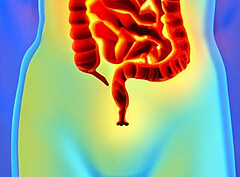Anal Cancer Screening:
New Microbiome-Associated Biomarkers Could Improve Prevention [20.07.23]
Now online in Nature Medicine: Findings of European research collaboration with University of Hohenheim could reduce unneeded biopsies and boosts HPV CancerScreening accuracy
A new study published in Nature Medicine, July 2023 has identified two novel markers for screening high-grade squamous intraepithelial lesions (HSIL), a precursor to anal cancer, from the anal microbiome of people with HIV (PWH). PWH are at a significantly higher risk of developing anal cancer, particularly among men who have sex with men (MSM). Current screening methods, such as anal cytology, have low specificity for detecting HSIL, which hinders the prevention of anal cancer. doi.org/10.1038/s41591-023-02407-3
In a European collaboration led by Sergio Serrano-Villar, including researchers from Spain (Manuel Ferrer), Italy (Camilla Tincati), Germany (Jana Seifert), United Kingdom (Rafael Bargiela) and Norway (Marius Troseid), the study recruited 213 participants most of whom were MSM undergoing HSIL screening with high-resolution anoscopy and anal biopsies to confirm HSIL.
The team used a range of techniques to analyze their anal microbiome, defining changes in its composition and metabolic activity (production of proteins and molecules). While the researchers did not find clear microbiome composition signatures associated with HSIL, they identified that the anal bacteria associated with HSIL overexpressed proteins involved in the production of succinyl-CoA and cobalamin, with levels consistently increased in subjects with HSIL in both the discovery and validation cohorts.
The combined measurement of succinyl-CoA and cobalamin overperformed anal cytology, improving sensitivity, specificity, and predictive values. This discovery of two novel biomarkers in the anal microbiome is a major breakthrough in the fight against anal cancer in PWH.
“The proteins overexpressed in the microbiome of patients with HSIL seem to contribute to cancer pathogenesis and bacterial infection. Our findings highlight that more important than knowing what bacteria are there is understanding what they are doing. Our findings suggest that beyond their value in screening for HSIL, bacteria play a relevant role in the development of these lesions. We should next investigate these proteins and molecules as potential therapeutic targets to combat cancer”, said Manuel Ferrer.
"Our discovery of two new biomarkers for which detection methods can readily be established could improve the current strategy of anal cancer screening. This could potentially improve outcomes for people with HIV, who are at a significantly higher risk of developing anal cancer," added Jana Seifert.
The lead researcher, Dr. Serrano-Villar, said, “We believe that our findings have the potential to reduce the burden of this devastating disease. But beyond this disease, our study demonstrates the potential of harnessing the microbiome to discover scalable diagnostic markers"
The next step for the researchers is to develop a cost-effective and non-invasive non-invasive diagnostic test that can be used in clinical practice to improve the screening and prevention of anal cancer in PWH.
The full article is online available in Nature Medicine
Serrano-Villar S, Tincati C, Raju SC, Sáenz JS, Moreno E, Bargiela R, Cabello A, Sendagorta E, Kurz A, Perez Molina JA, de Benito A, Hov JR, Fernandez-Lopez L, Muriel A, del Campo R, Moreno S, Trøseid M, Seifert J, Ferrer M. (2023) Microbiome-derived cobalamin and succinyl-CoA as biomarkers for improved screening of anal cancer.
Nature Medicine. 29. 1738–1749. doi: 10.1038/s41591-023-02407-3


